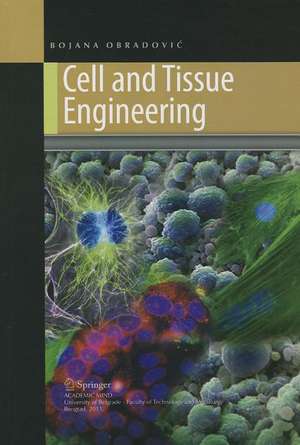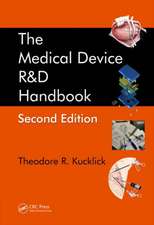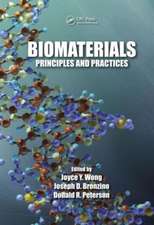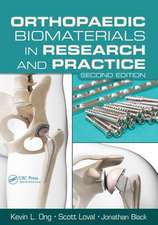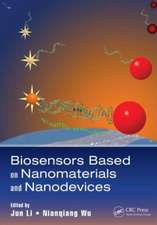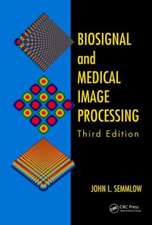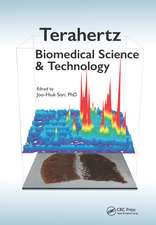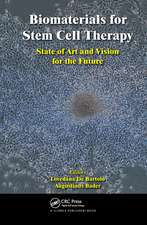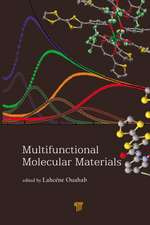Cell and Tissue Engineering
Editat de Bojana Obradovićen Limba Engleză Hardback – 14 dec 2011
The book is composed of 13 chapters all of which are written by the leading experts. It is organized to gradually assemble an insight in cell and tissue function starting form a molecular nano-level, extending to a cellular micro-level and finishing at the tissue macro-level. In specific, biological, physiological, biophysical, biochemical, medical, and engineering aspects are covered from the standpoint of the development of functional substitutes of biological tissues for potential clinical use. Topics in the area of cell engineering include cell membrane biophysics, structure and function of the cytoskeleton, cell-extracellular matrix interactions, and mechanotransduction. In the area of tissue engineering the focus is on thein vitro cultivation of functional tissue equivalents based on the integrated use of isolated cells, biomaterials, and bioreactors. The book also reviews novel techniques for cell and tissue imaging and characterization, some of which are described in detail such as atomic force microscopy. Finally, mathematical modeling methods are presented as valuable and indispensable tools in cell and tissue engineering. Numerous illustrations enhance the quality and ease of use of the presented material.
| Toate formatele și edițiile | Preț | Express |
|---|---|---|
| Paperback (1) | 715.35 lei 43-57 zile | |
| Springer Berlin, Heidelberg – 11 dec 2018 | 715.35 lei 43-57 zile | |
| Hardback (1) | 723.57 lei 43-57 zile | |
| Springer Berlin, Heidelberg – 14 dec 2011 | 723.57 lei 43-57 zile |
Preț: 723.57 lei
Preț vechi: 761.65 lei
-5% Nou
Puncte Express: 1085
Preț estimativ în valută:
138.50€ • 150.49$ • 116.41£
138.50€ • 150.49$ • 116.41£
Carte tipărită la comandă
Livrare economică 21 aprilie-05 mai
Preluare comenzi: 021 569.72.76
Specificații
ISBN-13: 9783642219122
ISBN-10: 3642219128
Pagini: 280
Ilustrații: IX, 276 p.
Dimensiuni: 155 x 235 x 17 mm
Greutate: 0.61 kg
Ediția:2012
Editura: Springer Berlin, Heidelberg
Colecția Springer
Locul publicării:Berlin, Heidelberg, Germany
ISBN-10: 3642219128
Pagini: 280
Ilustrații: IX, 276 p.
Dimensiuni: 155 x 235 x 17 mm
Greutate: 0.61 kg
Ediția:2012
Editura: Springer Berlin, Heidelberg
Colecția Springer
Locul publicării:Berlin, Heidelberg, Germany
Public țintă
ResearchCuprins
From the Contents: Creation of Living Tissue: An Engineering Feat.- Classical and Quantum Information Processing in DNA-Protein Coding.- Unraveling the Membrane Fusion in Secretory Cells at The NM-Level: A Nanobioengineering Approach.- Biophysical and Biochemical Determinants of Contractile Force Generation, Regulation, and Function.
Textul de pe ultima copertă
“Cell and Tissue Engineering” introduces the principles and new approaches in cell and tissue engineering. It includes both the fundamentals and the current trends in cell and tissue engineering, in a way useful both to a novice and an expert in the field.
The book is composed of 13 chapters all of which are written by the leading experts. It is organized to gradually assemble an insight in cell and tissue function starting form a molecular nano-level, extending to a cellular micro-level and finishing at the tissue macro-level. In specific, biological, physiological, biophysical, biochemical, medical, and engineering aspects are covered from the standpoint of the development of functional substitutes of biological tissues for potential clinical use. Topics in the area of cell engineering include cell membrane biophysics, structure and function of the cytoskeleton, cell-extracellular matrix interactions, and mechanotransduction. In the area of tissue engineering the focus is on thein vitro cultivation of functional tissue equivalents based on the integrated use of isolated cells, biomaterials, and bioreactors. The book also reviews novel techniques for cell and tissue imaging and characterization, some of which are described in detail such as atomic force microscopy. Finally, mathematical modeling methods are presented as valuable and indispensable tools in cell and tissue engineering. Numerous illustrations enhance the quality and ease of use of the presented material.
The book is composed of 13 chapters all of which are written by the leading experts. It is organized to gradually assemble an insight in cell and tissue function starting form a molecular nano-level, extending to a cellular micro-level and finishing at the tissue macro-level. In specific, biological, physiological, biophysical, biochemical, medical, and engineering aspects are covered from the standpoint of the development of functional substitutes of biological tissues for potential clinical use. Topics in the area of cell engineering include cell membrane biophysics, structure and function of the cytoskeleton, cell-extracellular matrix interactions, and mechanotransduction. In the area of tissue engineering the focus is on thein vitro cultivation of functional tissue equivalents based on the integrated use of isolated cells, biomaterials, and bioreactors. The book also reviews novel techniques for cell and tissue imaging and characterization, some of which are described in detail such as atomic force microscopy. Finally, mathematical modeling methods are presented as valuable and indispensable tools in cell and tissue engineering. Numerous illustrations enhance the quality and ease of use of the presented material.
Caracteristici
Provides a resource and stimulus for biomedical engineering research and education Written by the leading experts Assembles an insight in cell and tissue function starting form a molecular nano-level, extending to a cellular micro-level and finishing at the tissue macro-level Illustrations enhance the quality and ease of use of the presented material Includes supplementary material: sn.pub/extras
